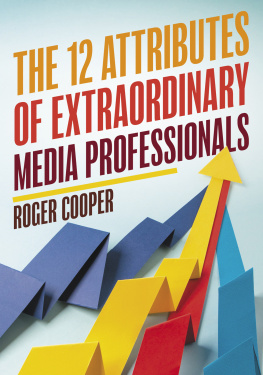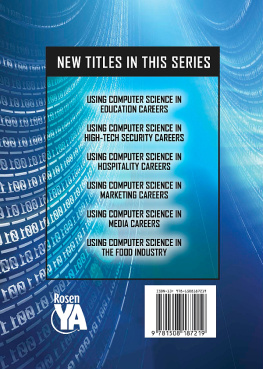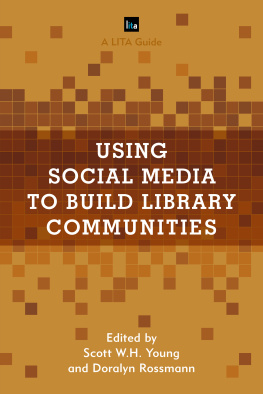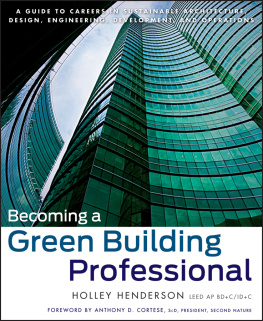The 12 Attributes of Extraordinary Media Professionals
Praise for The 12 Attributes of Extraordinary Media Professionals
From the little things to the big picture, Roger Coopers 12 Attributes of Extraordinary Media Professionals offers students and media professionals in any stage of their careers practical advice and tips for developing the soft skills so critical to success. I plan on adopting it for the leadership seminar Im teaching.
Marianne Barrett, Arizona State University
The twelve attributes Cooper details in his book are applicable to career development stemming from organic human needs. Not only are they a great guide for attaining a career in the film industry, but they are also a great guide for creating a career you are happy to wake up to every day, surrounded by people with ethics similar to your own. As with all our choices along lifes journey, we create more of what we pursue, and this perspective is invaluable for joy in the field, for the long haul.
Reena Dutt, producer, actor, director
Cooper has written an extremely valuable and timely book. His exploration of the attributes we continually work to develop in our students is done with illustrative stories, wisdom, and humor. This book should be required reading for every student who aspires to a career as a media professional.
Robin Howard, director, Syracuse University LA Semester
What are the characteristics that propel some to long-term success while other equally talented people fail? The 12 Attributes of Extraordinary Media Professionals is like a checklist for success. Since reading it, I see proof of these ideas repeatedly in the people I work with and in my own career. I cant recommend it enough.
Dan OShannon, Emmy-winning writer/producer
Ive worked with hundreds of students from colleges and universities across the nation, encouraging them to dream big and pursue those dreams with confidence. Coopers 12 Attributes of Extraordinary Media Professionals is a stabilizing must-read for anyone starting a career in media.
Nancy Robinson, director of education programs, Television Academy Foundation
The 12 Attributes of Extraordinary Media Professionals is informative, inspiring, and much needed in our field. Cooper speaks directly with readers, often with a great sense of humor. Readers will not feel like theyre reading a book, but rather engaging with a caring mentor. This is a book written from the heart of a true educator and will capture the heart of its readers. As a media professor, Im excited to adopt this book in my classes.
Tang Tang, Kent State University
Roger Cooper without a doubt knows the qualities one needs to succeed at their craft. Ive experienced his gentle yet passionate way with students firsthand. Now everyone can experience the Roger Cooper way. I highly recommend it.
Herb Trawick, creator and co-host, Pensados Place
The 12 Attributes of Extraordinary Media Professionals
Roger Cooper
Ohio University
ROWMAN & LITTLEFIELD
Lanham Boulder New York London
Credits and acknowledgments for material borrowed from other sources, and reproduced with permission, appear on the appropriate pages within the text.
Published by Rowman & Littlefield
An imprint of The Rowman & Littlefield Publishing Group, Inc.
4501 Forbes Boulevard, Suite 200, Lanham, Maryland 20706
www.rowman.com
86-90 Paul Street, London EC2A 4NE, United Kingdom
Copyright 2022 by The Rowman & Littlefield Publishing Group, Inc.
All rights reserved. No part of this book may be reproduced in any form or by any electronic or mechanical means, including information storage and retrieval systems, without written permission from the publisher, except by a reviewer who may quote passages in a review.
British Library Cataloguing in Publication Information Available
Library of Congress Cataloging-in-Publication Data
Names: Cooper, Roger, 1961 author.
Title: The 12 attributes of extraordinary media professionals / Roger Cooper.
Other titles: Twelve attributes of extraordinary media professionals
Description: Lanham : Rowman & Littlefield, [2022] | Includes bibliographical references and index. | Summary: Few future media professionals understand that personal attributes like adaptability and integrity are just as important as industry knowledge. This book combines examples of successful professionals with activities to begin readers development of attributes that will remain relevant despite career-stage or future technological developmentProvided by publisher.
Identifiers: LCCN 2021014403 (print) | LCCN 2021014404 (ebook) | ISBN 9781538116265 (cloth) | ISBN 9781538116272 (paperback) | ISBN 9781538116289 (epub)
Subjects: LCSH: Mass mediaVocational guidanceUnited States. | Mass mediaMoral and ethical aspectsUnited States.
Classification: LCC P91.6 .C3767 2022 (print) | LCC P91.6 (ebook) | DDC 302.2302/3dc23
LC record available at https://lccn.loc.gov/2021014403
LC ebook record available at https://lccn.loc.gov/2021014404
 The paper used in this publication meets the minimum requirements of American National Standard for Information SciencesPermanence of Paper for Printed Library Materials, ANSI/NISO Z39.481992.
The paper used in this publication meets the minimum requirements of American National Standard for Information SciencesPermanence of Paper for Printed Library Materials, ANSI/NISO Z39.481992.
Dedicated to
Patricia Cooper
My light from above
Brief Contents
Preface
A simple question changed my professional life.
In 2000, successful media professionals from around the United States came to my university for a day-long alumni conference. Some of these former students had graduated only a year or two earlier, while others had been media professionals for twenty years. I had taught some of these professionals in my classes, but others I met for the first time. The interests and professional positions covered a range of the media industries. Some worked in strictly creative positions, such as writers, directors, and performers, while others worked more on the business side, such as production managers or in sales, marketing, promotion, and finance at a major Hollywood studio.
During these seminar sessions, I listened to numerous stories (often painful, but never boring) about the struggles our graduates had undertaken to find work and to gain a foothold in the profession. For some, simply finding any job related to media took months of hard work, followed by months, even years, of low pay. Some had developed a specific technical skill while in school, such as operating a camera or editing, and continued to use that skill in the industry. Some others had displayed no direct interest in a specific skill while in college but had taken positions that were now highly technical in nature. Others had gravitated into areas unrelated to their interests while in college. Still others did not major in our media program, and they, too, were building successful careers. I also realized that a sizeable percentage of our graduates, excellent students and people, never found entry into any part of the business and moved into entirely different professions. I had lost track of many of them. I wondered if they were happy with what they are doing now.
As these individuals enthusiastically offered advice to our current students about how to navigate the media professions, I looked at our programs most successful professionals and played a kind of game ascribing reasons behind these individual successes. I soon determined, at least with my schools graduates, that effective navigation through a highly competitive, broad set of industries couldnt be pinpointed solely to grade point average (GPA), intelligence, our curriculum, innate artistic talent, or a specific technical skill. Although I couldnt yet put my finger on it, there seemed to be a link missing between what our graduates knew, what marketable skills they might have, and how they might traverse most effectively









 The paper used in this publication meets the minimum requirements of American National Standard for Information SciencesPermanence of Paper for Printed Library Materials, ANSI/NISO Z39.481992.
The paper used in this publication meets the minimum requirements of American National Standard for Information SciencesPermanence of Paper for Printed Library Materials, ANSI/NISO Z39.481992.